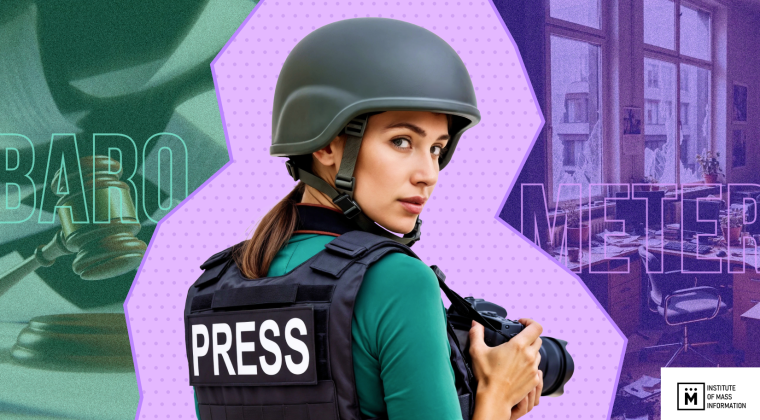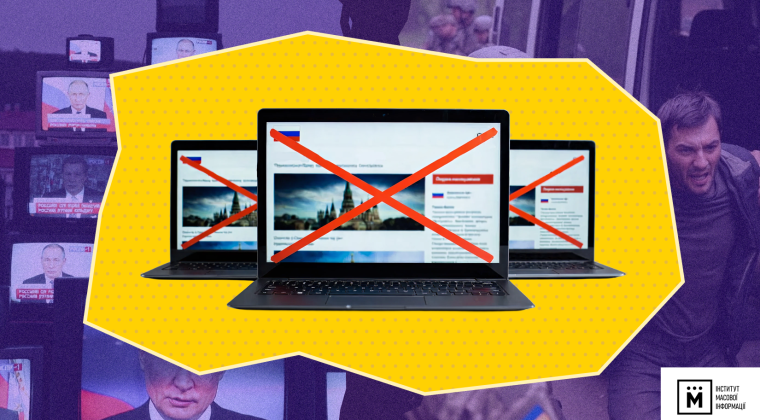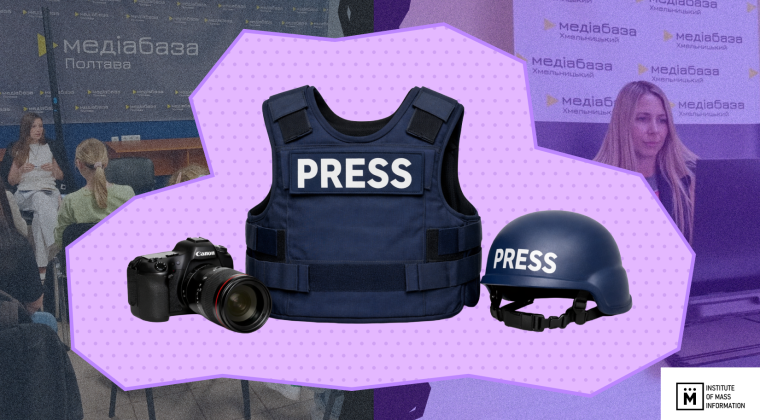Warning! The article features a photo that may be disturbing.
In December 2023 – January 2024, two Kharkiv hotels were targeted by Russian troops. Both hotels had media workers staying there. The shelling strikes injured several of them.
On December 30, 2023, the Ukrainian interpreter for the German TV channel ZDF, Svitlana Dolbysheva, was injured in the Russian shelling strike on Kharkiv on December 30, 2023. At the time of the explosion, the channel’s team was in the Kharkiv Palace Hotel, which was hit by a Russian missile. She was diagnosed with a concussion, an open wound in the head, a lung contusion and hematoma, and fractured ribs.
In her comment to the IMI, Svitlana recalled getting out of the destroyed hotel. She pointed out the architectural layout of the building – an 11-story atrium. After movning in, Dolbysheva came down into the lobby to wait for her colleagues, sat down on a chair by the piano, opened TikTok and read two poems by Vasyl Symonenko.
“I only remember individual images after that. That entire atrium crumbling down. Next thing is the floor. I think I was in such a position that I was crawling on all fours. I literally only made maybe four such steps. And then the second missile hit; the entire ceiling started falling down and a piece of concrete fell down on me. I saw it bouncing off of me. At that moment, I was crawling towards the elevator,” recalls Svitlana Dolbysheva.
She threw off the ceiling piece, stood up and ran. Although her cell phone was almost dead, she turned on the video recording, saw the signs leading to the underground parking lot and followed them.

Svitlana Dolbysheva. Photo provided to the IMI by Svitlana Dolbysheva
“The corridors seemed like a maze where you turn right, turn left, turn right. And you don’t seem to get any closer to this place. My last such stop was when I reached the last sign of the underground parking lot, leading to the elevator. But the elevator was blocked, the doors were open, but they didn’t move. At that moment, the shock passed, started to pass,” said Svitlana.
At that moment, she felt a very acute pain, realized that she had a head injury, noticed the blood on her hands. Walking became painful.
“I sat down with the feeling that I did everything I could to rescue myself, and failed. As I was running to the parking lot, I thought about my colleagues: where could they be at this moment? But it was so difficult for me to walk that I realized: until I reach some place myself, I will not be able to make sense of my surroundings and start looking for them,” explains the ZDF interpreter.
She notes that she was already semi-conscious by the time she reached the elevator. Hotel staff were running past her – a bewildered group of five or seven people. They asked her how she was feeling. “I remember that I heard them, but I couldn’t say anything. Breathing was difficult both due to the lung injury and the dust fogging up all those floors. Then one of them asked me if I could run. I nodded to that. They took my hand, and together we started running somewhere,” Dolbysheva adds.
Video provided to the IMI by Svitlana Dolbysheva
Together with these people, Svitlana got back to the hotel. Her colleagues approached her.
“Pain and shock somehow outpower fear. Because your focus shifts to how to just carry yourself, your body, to safety. And I was not terrified. My colleagues, who were not injured, were quite shaken by this event emotionally, I feel. And no wonder,” Svitlana says.
According to her, they had to wait a long time for the doctors. She says that moment was concerning.
“These shellings are terrible. And especially in Kharkiv the strikes now feel like they are completely random, just terrorizing the population. But the people and the services seemed somehow insufficiently ready to me,” the media worker notes.
By the time doctors approached Svitlana and called an ambulance, she could no longer move on her own.

Svitlana’s wounds. Photo provided to the IMI by Svitlana Dolbysheva
“The pain was growing by the minute. And breathing was increasingly difficult. Later, I realized that the ambulance cars could not get through because of the debris scattered around the hotel. The first patients they took, the wounded, were those who could come out to them or who could be brought out to them. Our crew’s driver went outside time and again and tried to catch an ambulance and somehow coordinate it, lead it down to this underground parking lot, so that I could be taken away on a stretcher,” adds Svitlana.
Later, her colleagues found an ambulance that brought her from Kharkiv to Kyiv, where she had to spend 10 days in a hospital.
“I feel normal overall. It hurts, but you know what they say, it will get better eventually,” says Svitlana.
The ZDF condemned the attack on the hotel where the journalists were staying. “This is another attack on the free press by Russia. We hope that our injured colleagues recover quickly. The ZDF will continue to report on the war against the Ukrainian civilian population,” ZDF Editor-in-Chief Bettina Schausten said.
According to a hotel manager, a total of 15 rooms were rented out, of which at least 10 were given to journalists.
On January 10, 2024, the Russians shelled the Park Hotel in Kharkiv, injuring at least three journalists. Two of those, Davit Kachkachishvili and Özge Elif Kızıl, work for the Turkish news agency Anadolu. They were taken to a hospital for examination by an ambulance. Kachkachishvili has minor cuts on his hands. The crew’s car was destroyed, as were most of the cars parked nearby.

The destroyed “Anadolu” car. Photo: head of investigations at the Kharkiv Oblast NPHQ, Serhiy Bolivanov, on Facebook
The journalists said that they were shocked by the audacity of the Russians, since this site was exclusively civilian and no military personnel were present.

The injured “Anadolu” media workers Davit Kachkachishvili and Özge Elif Kızıl. Photo: head of investigations at the Kharkiv Oblast NPHQ, Serhiy Bolivanov, on Facebook
The Ukrainian fixer for the TV channel France 2, Violetta Pedorych, was also injured by the strike.
The doctors who examined the Violetta on the spot offered to hospitalize her, but she refused. Although Violetta is feeling more or less well, she has a glass shard stuck in the bridge of her nose. The doctors cannot remove it at the moment, and they will observe her recovery for some time. It is quite possible that the shard will be left as it is, so as not to make it worse.
In her comment to IMI, Violetta noted that she agrees that the occupiers are targeting hotels where journalists stay.
According to her, they would always meet colleagues from various outlets, representatives of international organizations whenever they stayed at the Park Hotel.

Violetta Pedorych after the Russian strike. Photo by Violetta Pedorych on Instagram
Volodymyr Tymoshko, the head of the Kharkiv Oblast National Police HQ, said that Russia had shelled the hotel in Kharkiv deliberately and that all the victims were civilians.
“They are all civilians, including foreign journalists, they work in Kharkiv oblast, Donetsk oblast, reporting the truth about the crimes committed by the ruscists on Ukrainian soil. Russia hit the hotel deliberately – a 4-meter-deep crater was discovered on the spot, and a Russian rocket destroyed another building nearby,” Tymoshko said.
Volodymyr Tymoshko noted in a comment to Suspilne that the hotel that was hit by the Russians was mostly used by foreign journalists.
“Soldiers have never stayed in this hotel, almost all of Kharkiv knows that. This hotel was used by journalists. It was a well-known fact. At the time of the attack, foreign journalists, namely from Turkiye, were staying in the hotel. This leads me to believe that the Russian Federation was targeting the mass media specifically,” said Tymoshko.
Attacks on venues that are popular among journalists have happened earlier as well. For instance, on June 27, 2023, the Russian troops opened fire on Kramatorsk. One Iskander missile hit a downtown pizzeria busy with patrons, including media workers. British freelance photographer Anastasia Taylor-Lind and Colombian journalist Catalina Gómez, who were at the pizzeria at the time, were injured. The writer Victoria Amelina was also wounded. She was at the pizzeria with a delegation of Colombian journalists and authors. She died in the Mechnikov Hospital in Dnipro on July 1.
After the attack on Kharkiv hotels, a local journalist, AFP stringer Serhiy Bobok wrote that media workers who plan to visit Kharkiv should consider renting an apartment instead of staying in a hotel. He advises against staying in the city’s center, anywhere near the “Malyshev Plant” metro station or the railway station “Kharkiv – Sortuvalny”.
“Don’t rent apartments in places where you see a lot of cars in ‘military’ colours, even if no soldiers live there: it seems that spies still see those places as a possible target. Do not rent apartments near hotels, dormitories, educational institutions, industrial zones, military facilities (even long abandoned),” Bobok wrote.
According to him, it is better to choose residential neighborhoods such as Pavlovo Pole, Oleksiivka, Saltivka, Novi Domy.
“However, I wouldn’t expect to come by a restaurant or a cafe in such neighborhoods. Some have those, but there are very few compared to 2021. Most of the establishments are downtown, but there are shopping malls everywhere, most of them work until 10:00 p.m., chain shops such as “Klas”, “Rost”, “Silpo” (etc) offer quite decent cooking among other things, many of them also have tables where you can eat (sometimes this is convenient). Some malls have cafes or food courts – well, choose for yourself, some of those are decent, others not so much,” Serhiy Bobok added.
IMI has prepared accommodation tips for journalists on business trips
The idea that you should stay downtown wear all badges of a journalist is no longer relevant because civilians, including journalists, have become the Russians’ targets in this war. Therefore, as you choose a place to stay on a business trip, we recommend you:
- Avoid hotels, especially large hotels or those where journalists are known to stay. Your best options can be a rented apartment or small aparthotels with up to five rooms.
- Always check the latest news about the strikes on the city where you plan to go on a trip. Do not stay, arrange meetings, or eat in cafes in the neighborhoods that are under constant fire.
- Depending on your place of destination, you can stay in the safer settlements nearby. In Kharkiv’s case, Poltava would be a good option. If you have a car, Kharkiv is less than a two hours’s drive away, and the safety situation in Poltava is much better.
- If you have already decided to stay in a hotel, it is best to park your car in an underground parking lot or a little further from the hotel, within a 10-minute walk.
IMI monitors Russia’s crimes against the media and journalists in Ukraine. In the year and ten months since the start of the full-scale invasion, Russia has committed 548 crimes against journalists and media in Ukraine.
Valentyna Troyan, media expert at the Institute of Mass Information



